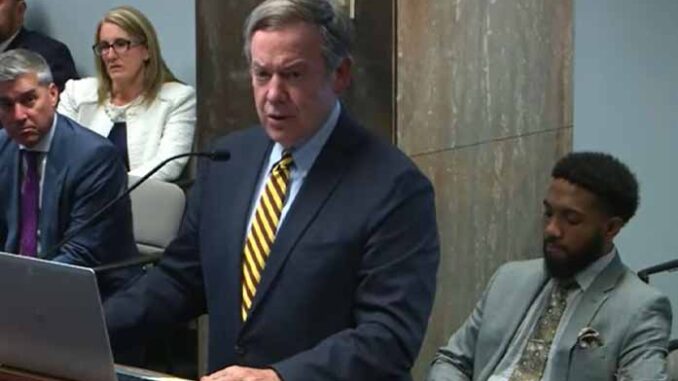
At the same time more than 2 million Arizona voters are receiving early ballots, the political fallout continues in the governor’s race in the wake of Arizona Secretary of State Katie Hobbs’ refusal to debate her Republican opponent, Kari Lake.
That fallout includes a threat by a longtime state lawmaker to end public financing of Arizona Public Broadcasting Service (AZPBS) in light of potential violations of state election laws by the Arizona State University-owned station. Questions have even been raised about whether ASU President Michael Crow acted to undermine the Arizona Clean Elections Commission.
Lake was scheduled Wednesday night to be the subject of a 30-minute question and answer event sponsored by the voter-funded Clean Elections Commission and to be broadcast by AZPBS. Lake was appearing solo, given that Hobbs has refused for months to take part in any face-to-face debate or shared stage event with Lake.
The event would be similar to how the commission handled Hobbs’ refusal to debate former Nogales Mayor Marco Lopez during the Democratic primary. But just as final preparations were being made Wednesday, Hobbs announced on a national news show that AZPBS officials covertly bypassed the Clean Elections Commission to give Hobbs her own 30-minute event next week.
As a result, the commission postponed Lake’s event in order to find another network to partner with for the broadcast.
ASU President Michael Crow created a separate controversy Thursday after it was reported by the Arizona Agenda he favored giving Hobbs her own 30-minutes of airtime, despite her continued snubbing of the Clean Elections Commission.
According to the report, Crow did not make the actual decision approving a Hobbs’ event, but indicated “that we need to continue to fulfill our mission of unbiased and non-partisan coverage of public figures and talk to important people in the public realm like Lake and Hobbs to have the public learn of their views, even if there is no debate.”
Disappointed to see @michaelcrow aided in subverting the Arizona Clean Elections Debate process. The left and the Education Lobby in AZ will do anything to influence the election and not hold Katie Hobbs accountable. The Board of Regents should step in and discipline Crow & PBS.
— Tyler Bowyer 🇺🇸 (@tylerbowyer) October 14, 2022
AZPBS, as an entity of ASU, receives public funds. That is something State Rep. John Kavanagh wants to see changed if Crow and station management fails to reverse course on its deal with Hobbs.
On Thursday, Kavanagh (R-Fountain Hills) announced plans to introduce legislation in January to sever all formal state ties with AZPBS, including financial support, if the split with the Clean Election Commission is not quickly resolved.
“It would be inappropriate for the state to continue its relationship with AZPBS, given its sabotaging of the clean election debates that were approved by the voters,” said Kavanagh, who questions if the decision by AZPBS to give Hobbs 30 minutes of broadcast time outside of a sanctioned Clean Election Commission event “is tantamount to making a partisan political contribution to their campaign.”
Hobbs and Lake were declared their parties’ respective nominees in August. In September, a request was made by Hobbs’ campaign to forego the traditional shared-stage, face-to-face debate format in favor of separate town hall style interviews by each candidate.
That effort was quickly spurned by the Clean Election Commission, although Hobbs’ campaign was given a week to change her mind or come up with a workable alternative. When Hobbs moved on, Lake agreed to go it solo.
For her part, Lake became aware of the AZPBS backdoor deal with Hobbs at the same time voters did.
“We just learned hours before airtime of tonight’s Clean Elections Commission debate that PBS has unilaterally caved to Katie Hobbs’ demands and bailed her out from the consequences of her cowardly decision to avoid debating me on stage,” Lake said Wednesday afternoon.
Since then, Hobbs’ aversion to debating Lake, or even appearing on stage with her opponent at the same time has garnered a lot of attention from Arizona voters and from Lake.
.@Karilake: "It basically tells every Democrat in the future that you don't have to debate the Republicans because if you bow out, PBS will just give you an opportunity on your own. You never have to have a debate. They essentially killed the debate system forever yesterday." pic.twitter.com/6YTuhfdDIh
— Kari Lake (@KariLake) October 14, 2022
.@Karilake: "I will debate her (@Katiehobbs) in the women's restroom, I will debate her on the street corner, I will debate her on a stage, I will debate her In a park, I will debate her in a theater, you name it. I will debate her anywhere." pic.twitter.com/FgxYCXqqFo
— Kari Lake (@KariLake) October 14, 2022
Even Gov. Doug Ducey called out Hobbs for not showing up for a debate.
“If you want to be governor of the state, you have to be able to stand and deliver against an opponent,” Ducey said Thursday. “That’s been the price of admission for decades at all levels of our political atmosphere, and she, for whatever reason, refuses to do it.”
